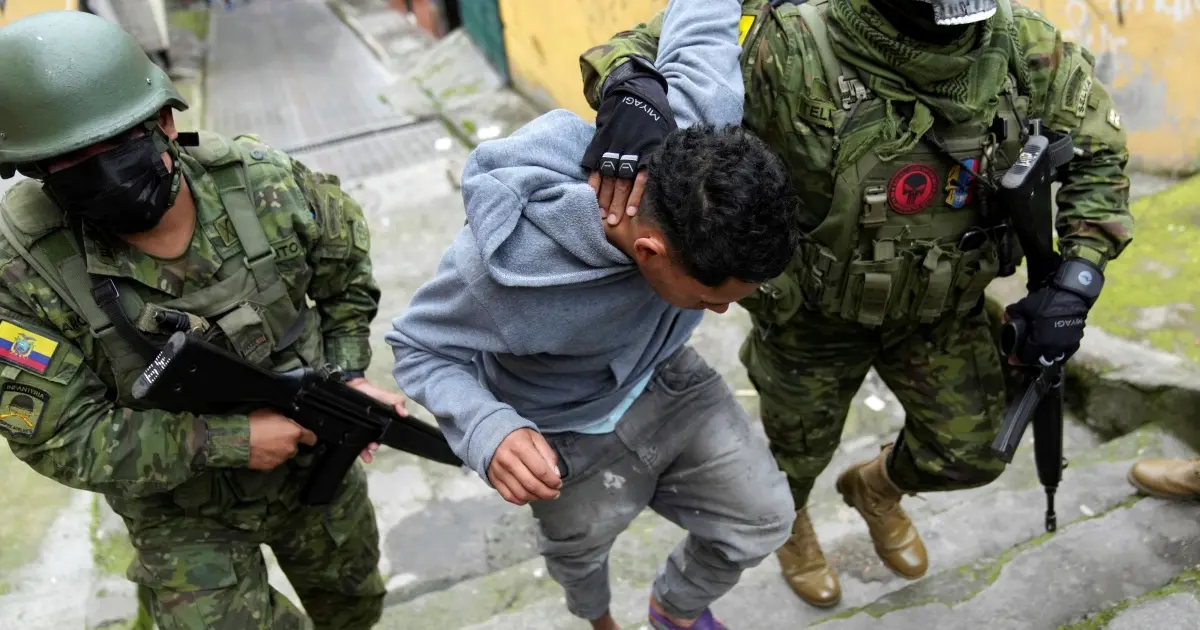The decision by Ecuador’s President Daniel Noboa to announce that the country is in an “internal armed conflict” has contributed to serious human rights violations by security forces, Human Rights Watch said today in a letter to President Noboa. The violations include at least one apparent extrajudicial killing and multiple cases of arbitrary arrests and ill-treatment.
On January 9, 2024, following a surge in violence, including the takeover of a state-owned TV channel, President Noboa decreed an “internal armed conflict” against 22 criminal groups operating in Ecuador, labeling them “terrorists.” Since then, overall killings in Ecuador have decreased, according to the government, but extortions and kidnappings have risen and the security situation remains dire, Human Rights Watch reports
“The escalation of violence—and the increase in organized crime—in Ecuador jeopardize Ecuadorians’ lives and institutions,” said Juanita Goebertus, Americas director at Human Rights Watch. “Instead of announcing a baseless ‘armed conflict,’ the government needs to respond with an effective and rights-respecting security policy that protects Ecuadorians.”
Between January and April, Human Rights Watch interviewed a dozen victims of abuse, along with their relatives and lawyers; requested information from multiple government ministries and agencies; analyzed 33 photographs and videos posted online; attended several court hearings virtually; and reviewed case files. Previously, in November 2023, researchers met with Attorney General Diana Salazar, as well as with several prosecutors, judges, and experts on organized crime in Guayaquil and Quito to document the causes of the increased criminal violence in the country.
Homicides in Ecuador increased by 574.30 percent from 2019 to 2023, from a rate of just over 7 to more than 47 per 100,000 people, the Ecuadorian Observatory on Organized Crime reported. Two large gangs—Los Choneros and Los Lobos—are allied with Colombian, Mexican, and Albanian drug traffickers and fight for control of territory and drug trafficking routes.
The ‘armed conflict’ announcement followed a violent takeover of the state-owned TV channel, TC Television, and the prison escape of José Adolfo “Fito” Macías Villamar, the leader of Los Choneros. Noboa ordered the Ecuadorian Armed Forces to carry out “military operations, under international humanitarian law and respecting human rights to neutralize” the 22 groups.
Under international law, the existence of an armed conflict is determined by a factual analysis of criteria including the level of organization of the armed groups and the intensity of hostilities. The Ecuadorian government has consistently failed to present sufficient evidence that fighting with any of the 22 criminal groups constitutes a non-international armed conflict.
Between January and April, the number of homicides in Ecuador dropped by 27 percent, the government reports. But extortions and kidnappings have risen, and the recent killings of three mayors and the director of a prison show that the situation remains serious. Ecuador’s militarization of its streets and prisons, meanwhile, has led to serious human rights violations by security forces.
In one case Human Rights Watch documented, soldiers killed 19-year-old Carlos Javier Vega and injured his cousin Eduardo Velasco in Guayaquil on February 2. The army said that Vega and Velasco had “attempted to evade a control point by ramming into military personnel” and labeled them “terrorists.” But Human Rights Watch interviews with witnesses, relatives, and lawyers of the victims—along with verified videos, photographs, and court records—contradict the army’s account, including its assertion that the young men were involved with criminal groups.
Throughout Ecuador, many people reported arrested appear never to have been taken before a prosecutor or judge. Although the police and military are required to inform prosecutors about arrests they make, many of the over 13,000 people reported arrested appear to have been detained for short periods outside of the legal process and, based on videos and photographs posted online and verified by Human Rights Watch, subjected to reprimands, beatings, and other degrading treatment.
The military, which has controlled Ecuador’s prisons since January, has held detainees incommunicado, at times hampering their right to consult with lawyers or to obtain medical assistance. Soldiers appear to be responsible for multiple cases of mistreatment and some cases of torture in prison. At a court hearing, one detainee described guards whipping him on the back with a cable and stepping on his finger. “Since they supposedly couldn’t hit me yesterday because I’m sick, they made me spread my legs and hit me in the testicles,” he said.
Authorities appear to have taken few steps to prevent human rights violations or ensure that those responsible are held to account. Instead, members of the National Assembly said in a statement that they were willing to pass an amnesty or pardon “whenever necessary to guarantee the work” of the police and army. President Noboa accused a judge who found human rights violations in prisons of being “unpatriotic.”
“The Armed Forces are not trained for policing and investigations. Putting them in that role heightens the risk of abuses, and the government should limit this to strictly necessary circumstances.” Goebertus said. “Ecuador needs more and better-trained justice and law enforcement officials investigating organized crime, not more soldiers on the streets.”









